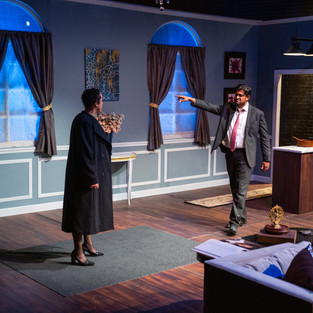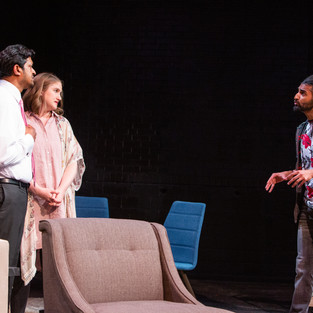DISGRACED, History, and Living Together Today
- iowastage
- Apr 22, 2019
- 2 min read
Updated: Jul 30, 2019
ISTC’s Production of Disgraced moved audiences and sparked conversation about our country and our lives this past May. In the program, Artistic Director Matthew McIver reflected on what the play, and the post-9/11 world it depicts, have meant to him personally and to our community.
In July of 2013 Ron Gilbert directed a reading of a Pulitzer Prize winning play, which I had the good fortune to perform in. It was a script and story that immediately seized my attention, and I have wanted to direct Ayad Akhtar’s Disgraced since that moment.
Why? Because the world changed after 9/11.
As a cast we shared where we were that day, what we were doing. I lived in New York City at the time, and in the days after the tragedy my home felt foreign. There was a military presence where none had been before; occasionally F-16 fighter jets would pass overhead in the clear September sky. I remember walking down a Brooklyn street at dusk and hearing, from an open apartment window, New Yorkers singing “God Bless America” and being instantly moved to tears.
It was a time when many felt, in all our rich and riotous diversity, the attack brought us together as a country. But there were those for whom the roiling emotions set loose by those attacks were dangerous. There were false reports of large American Muslim communities celebrating the falling of the towers, and very real increases in acts of prejudice and violence, which continue even to this day.
Akhtar’s story is set in 2011, a decade after the towers fell, and eight years before the present day. Life changed in those ten years for Muslim Americans, even apostate ones like Amir. And the raw emotions, fears and assumptions stirred up by those attacks are just below the surface. Some think, like Amir’s wife Emily, that art can bridge the divide. Some think, like his nephew Abe, that maybe we can’t really know each other.
I recall so clearly a moment something turned for me in those days after 9/11. On another impossibly clear, beautiful fall day I was walking through Union Square, which had been filled with protesters of all stripes, especially those who at that time were opposed to the US acting militarily. There was a female college student, practically nose to nose with a young blue collar guy from Brooklyn, both going full volume. And he’s saying I don’t feel safe, I feel like we need to get over there and get these guys, and she’s saying I don’t want more people to die, not in our name. And even though they’re inches apart, practically yelling, don’t agree at all, I realize that even so they’re listening to each other and responding and can see each other’s points, actually truly talking to one another. And I remember thinking maybe, just maybe, even at this fever pitch of emotion, we can listen and be all right.
We believe that theater can bring our diverse communities together, and at least give us a space to meet and talk. And in this day and age, that helps us all further along that road towards building a more perfect union.





























Comments